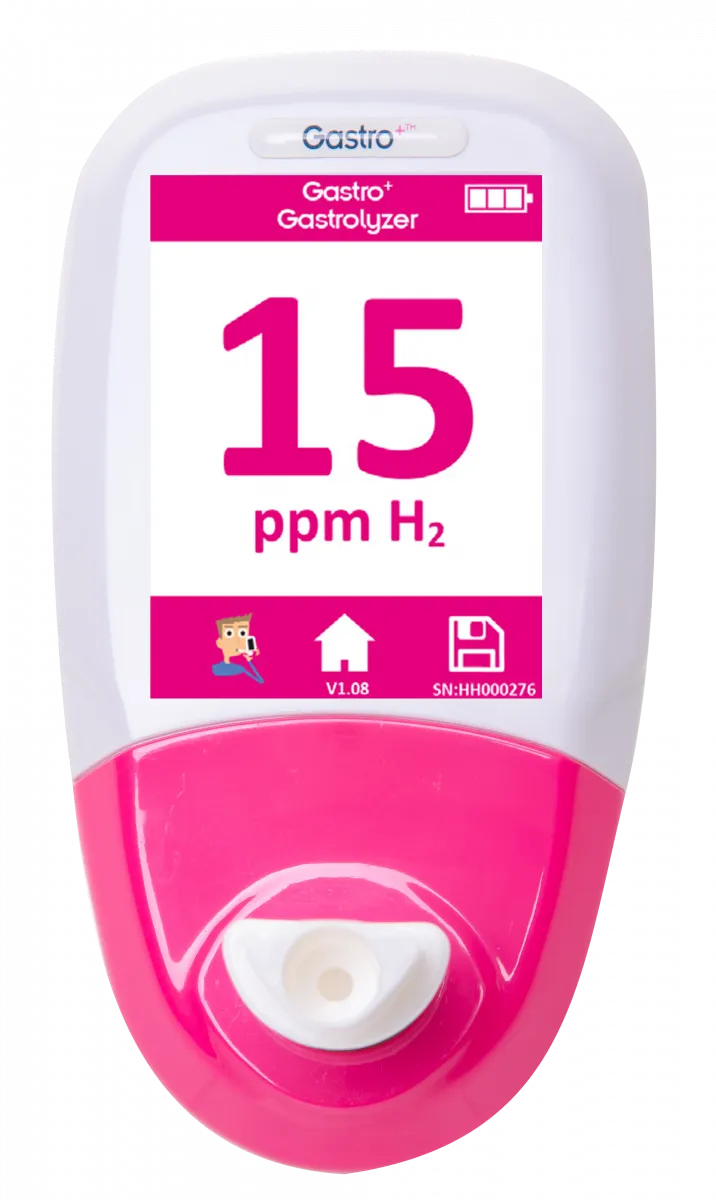Why is Hydrogen Breath Testing Used?

***Nausea, vomiting, gas, bloating, abdominal pain, diarrhea, constipation and other GI symptoms can have many causes. Other diagnoses should always be ruled out by a trained medical professional before a diagnosis of IBS or SIBO is made, as vague symptoms like gas and bloating can be suggestive of serious medical conditions like colorectal cancer and ovarian cancer. It is your responsibility to discuss all of your concerns with our office promptly, provide a detailed history of your symptoms, medical history and comorbidities, and inform us of any and all changes in your symptoms or health history in order to avoid delayed diagnoses and poor outcomes.
How does Hydrogen Breath Testing Work?
Hydrogen Breath Testing is a non-invasive way to investigate GI function and detect GI disorders like lactose intolerance, fructose intolerance, IBS (Irritable Bowel Syndrome), and SIBO.
Bacteria are present naturally in the gut and play an important role in normal bowel health and digestion. They aid in digestion and help prevent infection by destroying harmful bacteria and other microorganisms. They also produce vitamin K. A complex ecosystem of over 500 bacterial species lives in the gut. Bacteria are good in the right amounts, in the right places, in the right quantities, and the right types. Most gut bacteria are found in the large intestine.
When exposed to unabsorbed carbohydrates and sugars like lactose or fructose, bacteria produce hydrogen gas through a process called fermentation. Hydrogen is released across the gut wall and into your bloodstream. It is then carried to your lungs and exhaled. Hydrogen gas levels can be measured in your breath, which is what we’re measuring when we perform your breath test.
Elevated hydrogen levels tend to be associated with conditions like SIBO and IBS, and when food travels faster through your digestive tract than it should (as is the case in diarrhea).
Based on the levels of the gases your breathe out, we can determine what might be causing your GI distress and provide you with nutritional advice and/or treatment options for conditions like SIBO and IBS.
With lactose and/or fructose intolerance, elevated hydrogen levels will be detected at the beginning of your breath test. With SIBO, we’ll observe two separate periods during the test where hydrogen is produced: an earlier period caused by the bacteria that are overgrowing in your small intestine, and a later one caused by the bacteria present in your large intestine.
The Gastrolyzer breath test device that we use in our office instantly and accurately measures the amount of hydrogen found in a single expired breath sample. It is a simple, non-invasive and inexpensive way to help us identify a potential cause of your GI symptoms. The test takes roughly 3 hours to complete and is performed in our Flemington office.
How does Hydrogen Breath Testing work?
The test takes roughly 3 hours to perform. You’ll need to follow specific instructions for 4 weeks prior to the test and adhere to a special diet in the days and weeks leading up to the test.
Before the test begins you’ll be asked to breathe into a small device called the Gastrolyzer to obtain a baseline hydrogen level. You’ll then be asked to drink a sugar solution (lactose/milk, fructose/soda, or lactulose/a prescription). Breath samples will be taken every 15 minutes for first 30 minutes, and then every 30 minutes for the following 2 hours. At the end of the test a hydrogen profile will be obtained and Dr. Sinha will interpret this.
Are there any limitations to Hydrogen Breath Testing?
Some people don’t have bacteria that produce hydrogen. Fortunately, most of these individuals do have bacteria that produce methane instead. The Gastrolyzer device that we use in our office measures hydrogen levels. Additional testing may be required to measure methane levels if you are someone whose bacteria don’t produce hydrogen.
For some people food moves too quickly or too slowly through the GI tract. This may decrease the usefulness or effectiveness of the breath test, and lead to “false negative” results (where you actually have SIBO but the test results suggest otherwise).
Any condition that leads to undigested carbohydrates or sugars in the large intestine may result in an abnormal hydrogen profile or “false positive” breath test result (where your results are abnormal but NOT due to lactose intolerance, fructose intolerance, or SIBO, and instead a separate condition). Examples of conditions that may lead to false positive results include pancreatic insufficiency, where individuals lack the enzymes necessary to digest carbohydrates, and celiac disease, where the lining of the small intestine is abnormal and leads to malabsorption of carbohydrates and other nutrients from the gut.
***All abnormal breath test results should be interpreted in conjunction with a comprehensive review of your medical history and other lab and study test results.
Are there any risks or side effects associated with hydrogen breath testing?
There are very few risks associated with hydrogen breath testing. Some patients may experience diarrhea, gas, abdominal cramping, or bloating during or shortly after the test. This is not harmful and usually resolves itself within a day or so following the test. Nausea and vomiting have been reported. Symptoms are usually transient.
How can I be scheduled for a test?
Call our office today to schedule a comprehensive medical evaluation to determine if breath testing is an appropriate option for you.
